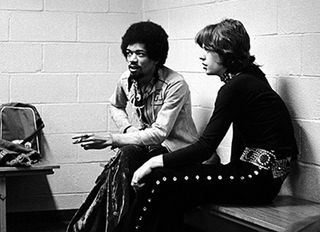
Jimi and Mick chillin' backstage
In addition to his unworldly gifts as a musician, Jimi Hendrix possessed a face that the camera just loved. To commemorate the 40th anniversary of his passing on 18 September 1970, and to celebrate the upcoming release of West Coast Seattle Boy: The Jimi Hendrix Anthology, a 4CD/1DVD box set, the San Francisco Art Exchange kicked off a month-long tribute to the late guitarist called Can You See Me? - A Life Through The Lens.
Can You See Me?, which features 40 images, some of which have never been see till now, includes works by photographers such as Ed Caraeff, Bruce Fleming, Elliot Landy and Gered Mankowitz, among others.
And there's even some shots taken by Hendrix producer and engineer Eddie Kramer, who attended the opening last Saturday (25 September) and gave attendees an advance preview of West Coast Seattle Boy.
On the following pages, you can gaze at a sampling of the wondrous shots on display at the San Francisco Art Exchange. And best of all, you can even buy prints, online or in person. Visit the gallery's official website for pricing and more information.
Our first photo takes us back to 1969, when the times were indeed a-changin'. The Beatles were breaking up, Woodstock had come and gone, and The Stones were 10 days shy of thing called Altamont.
On 27 November 1969, The Rolling Stones, on their first US concert tour in three years, gave one of their most historic lives shows ever. Eddie Kramer happened to be backstage and snapped a couple of rock icons, Jimi Hendrix and Mick Jagger, sittin' around talking before the big gig.
"On the occasion of Jimi's birthday, he visited The Stones at their Madison Square Garden concert," says Kramer. "He kindly asked me to tag along."
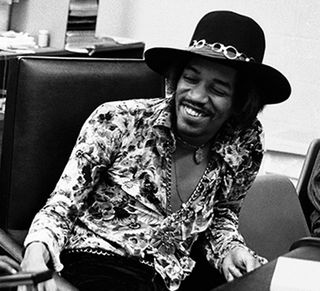
Jovial Jimi
Hendrix, in a lighthearted moment, cracks up with bassist Buddy Miles (out of the camera's range) at the Record Plant Studios in New York City in 1968 during the recording of Electric Ladyland.
"One of Jimi's most endearing traits was his amazing sense of humor," says Eddie Kramer. "Even though at times it was directed at myself, Mitch and Noel, his humor was often quite self-deprecating. This was all done in the desire to keep the session loose!"
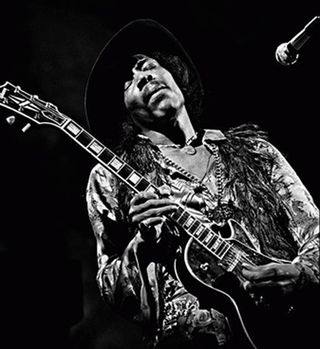
Jimi plays the Fillmore
On 10 May 1968, Jimi Hendrix appeared at the Fillmore East in New York City. He actually played two shows that night, and by all accounts, they were among his greatest performances.
Opening the concerts were a then little-known band called Sly & The Family Stone.
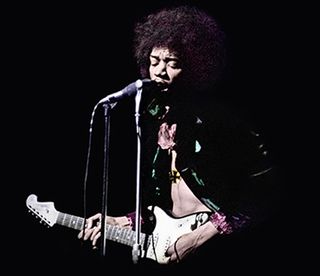
Jimi plays Sgt Pepper...for The Beatles!
In this recently discovered photo, Jimi Hendrix plays what can only be described as a high-pressure gig, as none other than The Beatles were in the audience. What did he open the show with? The title track to Sgt Pepper's Lonely Heart's Club Band, which had only been released three days earlier.
Knowing the Fab Four were in attendance, Hendrix wanted to pay tribute to pop's greatest band and learned the cut just minutes before going on stage. "The Beatles were blown away," remembers Eddie Kramer.
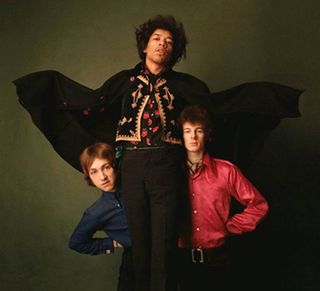
Are You Experienced, alternate album cover shot
An alternate photograph of Jimi, flanked by Mitch Mitchell and Noel Redding, taken for the UK cover of Are You Experienced?, the landmark 1967 album by The Jimi Hendrix Experience.
"He was terrific," recalls photographer Bruce Flemming. "This is the amazing thing. When I first met him he was so calm and quiet. If he didn’t understand you, he’d say ‘pardon me.' Then I went to one of his concerts. I couldn’t believe it.
"He was Jekyll and Hyde. He was so quiet off stage, so nice and kind and responsive, and then he got on stage and the sheer power of his personality and his playing ability hit you like a ton of bricks."
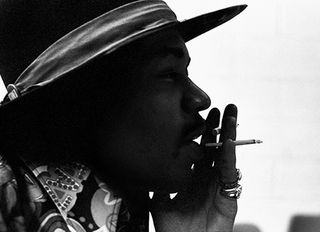
Smokin'!
Caught during a candid moment during the Electric Ladyland sessions at the Record Plant, Hendrix displays a rather unusual approach to his vices.
"Even though Jimi smoked grass he was never too stoned to work diligently and with tremendous focus on the task at hand," says Eddie Kramer. "This photo shows Jimi very relaxed and utilizing a unique system for smoking a joint and a cigarette at the same time. Even smoking was a 'stereophonic' experience."
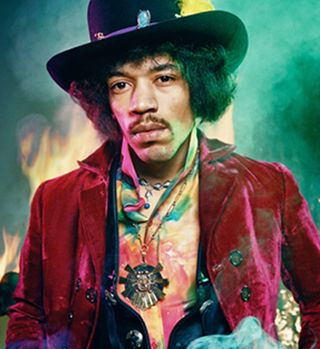
Let me stand next to your fire, indeed!
This photo was used for the back cover of the 1998 album, Experience Hendrix: The Best Of Jimi Hendrix, with Jimi appearing to be swallowed by the green and purple smoke, a reference to his iconic song, Purple Haze.
What many people would think to be a Photoshoped image was, in fact, the real thing, as photographer David Montgomery set an actual fire in back of Hendrix. Amazing how peaceful he looks.
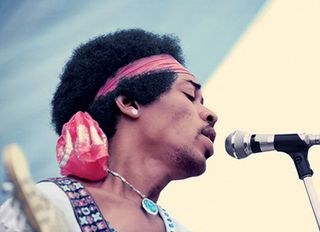
Jimi at Woodstock
Originally set to hit the stage at 3am, Hendrix, along with drummer Mitch Mitchell, bassist Buddy Miles, rhythm guitarist Larry Lee and two percussionists (Juma Sultan and Jerey Velez), didn't start start performing until 8am.
Remembers Eddie Kramer, "Even though Jimi had trouble with some of the musicians not being able to keep up with him, he was able to still deliver a masterful rendition of The Star Spangled Banner, which became the de facto theme song for the revolutionary 1970s.
"During Jimi's legendary performance at Woodstock, I was in the truck behind the stage recording the show and everything was running smoothly, so I asked the assistant engineer to watch the levels while I raced up to the side of the stage and grabbed shots of Jimi. Then I ran back to the truck and continued to record the rest of the show."
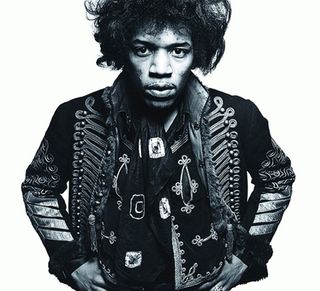
Hendrix in a classic pose
The front cover of The Ultimate Experience, a 1993 Jimi Hendrix greatest hits album, this shot is one of the most recognizable images in rock 'n' roll history.
"Jimi laughed a great deal and had a great sense of humor," recalls photographer Gered Mankowitz. "However, the look of the time was for everybody to be sullen and moody, but in spite of that a lot of my favorite photos have caught Jimi smiling."
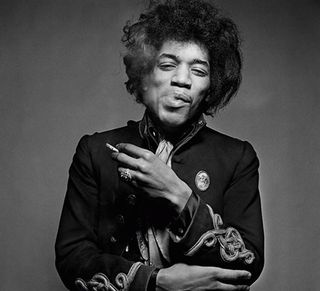
Calm, cool and collected
As photographer Gered Mankowitz attests, many of his most treasured shots of Jimi Hendrix caught the guitarist relaxed and smiling.
Here, Hendrix does just that, enjoying a moment of contentment during a smoke break at Mason's Yard Studios in London, 1967.
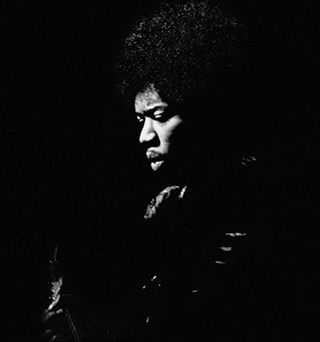
Jimi at the Saville Theatre, London, 1967
To cap things off, we present this moody and expressive shot, previously unseen, of Jimi Hendrix playing with The Experience at London's Saville Theatre, 4 June 1967.
It would prove to be his coming-out party of sorts, with The Beatles, Eric Clapton and other members of British rock royalty in attendance. Shows of this nature take on, over the years, a certain "Were you there?" kind of mythology. Luckily for us, Eddie Kramer was, and he brought his camera.
Liked this? Then check out Jimi Hendrix On MusicRadar
Connect with MusicRadar: via Twitter, Facebook and YouTube
Get MusicRadar straight to your inbox: Sign up for the free weekly newsletter

Joe is a freelance journalist who has, over the past few decades, interviewed hundreds of guitarists for Guitar World, Guitar Player, MusicRadar and Classic Rock. He is also a former editor of Guitar World, contributing writer for Guitar Aficionado and VP of A&R for Island Records. He’s an enthusiastic guitarist, but he’s nowhere near the likes of the people he interviews. Surprisingly, his skills are more suited to the drums. If you need a drummer for your Beatles tribute band, look him up.

“He sings on all our stuff. You hear him on AC/DC, Bryan Adams, Shania’s stuff. He has the best voice in the room”: Phil Collen says Mutt Lange is an ace vocalist who can nail it in one take – and it’s the same with guitar

“That's when the phone lines all over the world collapsed… The moment came when people fully understood what this was for”: The creation of The Cars’ song Drive and how it soundtracked a humanitarian catastrophe

“He sings on all our stuff. You hear him on AC/DC, Bryan Adams, Shania’s stuff. He has the best voice in the room”: Phil Collen says Mutt Lange is an ace vocalist who can nail it in one take – and it’s the same with guitar

“That's when the phone lines all over the world collapsed… The moment came when people fully understood what this was for”: The creation of The Cars’ song Drive and how it soundtracked a humanitarian catastrophe
Most Popular







